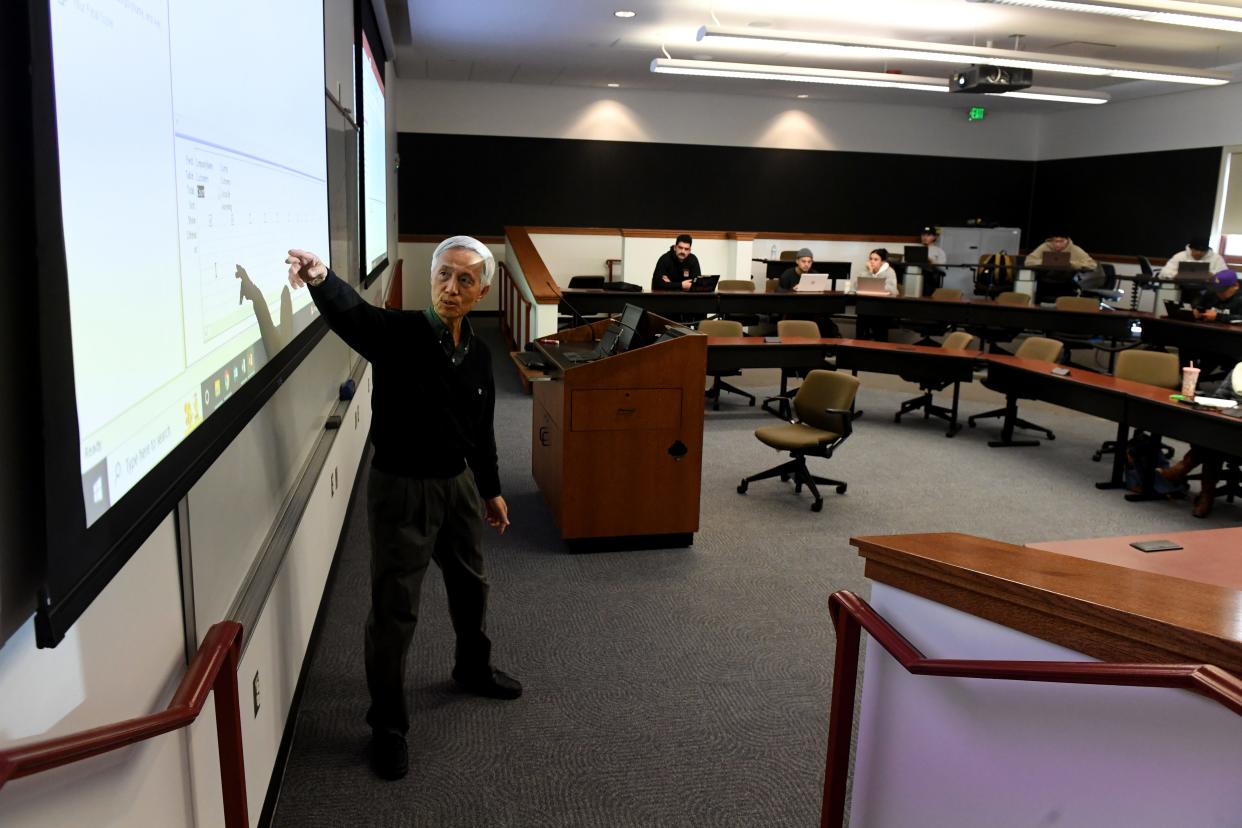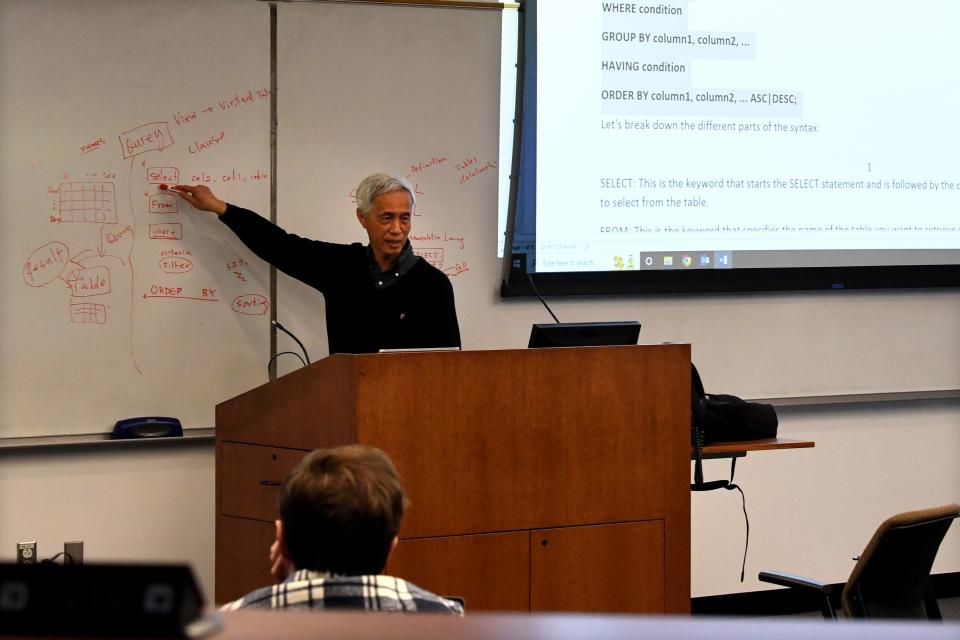AI is 'Here to stay.' How some county educators are cautiously engaging with ChatGPT

When Michael Weingarden, a Newbury Park High School math teacher, first attempted to use the artifically intelligent chatbot ChatGPT to solve a batch of statistics word problems, the results were disappointing.
The bot would start correctly, he said, but at each attempt the chatbot turned in the wrong final answer.
Soon after, a conversation with a software developer friend inspired Weingarden to try again, this time following the bot's wrong answer with a series of clarifying questions. With Weingarden's prompting, the bot worked its way to the correct answer, even explaining how it missed the mark at first blush.
"The light bulb went on over my head," Weingarden said. "I was like, 'Wow, this has some potential.'"
Four months after nonprofit OpenAI released its free ChatGPT program to the world, educators around the county and country are still trying to sort through its benefits and dangers. Some, including Los Angeles Unified School District officials, opted for an outright ban, though others have argued for its embrace.
Dana Thompson, an educational technology director with the Ventura County Office of Education, said she hasn't heard of any local districts banning the software.
For Weingarden, the conversation remains open.
"Whoever you talk to about ChatGPT right now is purely speculating," the longtime software programmer said. "Nobody has had it long enough to know what we're really gonna do with it or whether it's going to be helpful or harmful."
Weingarden said he's already had conversations about ChatGPT with his statistics classes, showing them a video of his conversation with the bot. He estimated about ⅓ of the students in two classes he informally polled had already used the software.
More: Q&A: County education tech director says students already using ChatGPT
See also: We asked ChatGPT to write this story for us. Here's what it came up with.
What about cheating?
Much of the initial concern about chatbots in classrooms has focused on the potential for cheating after some early tests showed ChatGPT, the best known bot on the market, capable of writing passing essays for AP English and college journalism courses.
The technology behind artificial intelligence tries to mimic human writing by processing huge banks of sample writing, identifying patterns in that writing and then replicating those patterns when generating responses to prompts. The bot doesn't store or interact with knowledge the way a human brain does, said Chen, but the result can still give the impression of human intelligence.
And though ChatGPT remains flawed — an experimental article the bot wrote for the Star contained multiple fabrications, for example — it is still in its infancy. In mid-March, OpenAI released GPT-4 , a new AI engine that showed marked improvement from the predecessor that drives ChatGPT.
Students are apparently already experimenting. Thompson, with the county's education office, said about half of the high school students in a January tech competition said they'd used the bot to help write code.
Minder Chen, a business professor at CSU Channel Islands, said a colleague recently caught two students turning in ChatGPT-generated essays.
Bot-written work is hard to catch, even if instructors smell something amiss, said Daniel Lenz, a lecturer in CSUCI's Writing and Multiliteracy Center. Though developers have published software that can tell the likelihood a response is AI-generated, Lenz said, "It can't tell you definitively."
"You can't really prevent students from using ChatGPT," he said. "The discussion has been more about how to guide its use within the classroom. That's still an open question: How do we evolve with it?"
Still, Thompson said she hasn't heard of any local districts banning the bot, and CSUCI leaders said the university does not have a blanket policy on AI use, leaving it up to individual instructors.

'An intelligent tutor?'
Some of those instructors, including Chen, are cautiously bringing bots into their curriculum. The professor tasked students in an entrepreneurship class with using ChatGPT on an assignment, documenting their interactions and comparing the chatbot to other tools.
"It is an emergent information technology. It fits right in," he said. "I wanted to encourage them to explore and figure out how to use it."
Chen said he still has concerns that students could rely on chatbots too much and miss out on learning fundamentals, but that used correctly, the bots could actually aid learning. He's hopeful future versions of ChatGPT could help him scale up computer coding training on campus.
"It's really an intelligent tutor," he said. "It's almost like a personal trainer that's available 24 hours a day, seven days a week, and it's free."
Jill Leafstedt, CSUCI's dean of Extended University and Digital Learning, said chatbots might be able to support students who learn differently.
"ChatGPT can really level the playing field," she said, before sketching out a scenario in which a student with trouble writing uses the bot to start an essay before adding their own writing, editing and citations. "Suddenly, this person is producing a really robust essay."
'Here to stay'
The software still can't be fully incorporated into K-12 curriculum without individual parent permission, Thompson said, because the way it is currently set up runs afoul of federal student data privacy law. But Thompson said she's still encouraging teachers to find ways to teach their students the basics of chatbot use in offline lessons.
"We have to give them these skills," she said. "If we don't, we're doing our students a disservice."
Artificial intelligence, she said, is "here to stay."
Chen said he has two students, one in real estate and one in a startup, who use chatbots to help draft marketing content like hashtags and social media posts. Leafstedt said one student used it as a genre guide while writing a graduate school admissions essay.
"It it being integrated into so much of what we do every day, everywhere," Leafstedt said. "We need to learn how to talk to machines."
Isaiah Murtaugh covers education for the Ventura County Star in partnership with Report for America. Reach him at isaiah.murtaugh@vcstar.com or 805-437-0236 and follow him on Twitter @isaiahmurtaugh and @vcsschools. You can support this work with a tax-deductible donation to Report for America.
This article originally appeared on Ventura County Star: How Ventura County educators are thinking about AI chatbots

